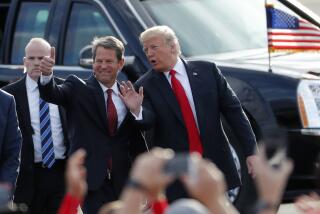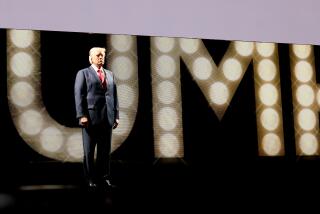Republican split deepens as House Speaker Ryan abandons Trump, says every candidate for themselves

Paul Ryan, speaker of the U.S. House of Representatives, is telling congressional Republicans that he will not defend Donald Trump.
- Share via
Reporting from Washington — With election day less than a month off, Republicans faced an extraordinary breach in party ranks Monday as House Speaker Paul D. Ryan declared he would no longer defend presidential nominee Donald Trump and instead focus on preserving the GOP’s majority in Congress.
Without formally withdrawing his endorsement, Ryan nonetheless delivered a stinging blow to Trump, urging Republican lawmakers in a conference call to do whatever they needed to win Nov. 8 — even if it meant cutting loose from the party’s national standard-bearer.
Ryan’s statements drew an immediate backlash, on Capitol Hill and at the party’s grass roots, as loyalists were stunned the top elected Republican in the country would abandon Trump at a time party leaders would normally be ramping up efforts to take back the White House.
Trump responded with a slap on Twitter. “Paul Ryan should spend more time on balancing the budget, jobs and illegal immigration and not waste his time on fighting Republican nominee,” Trump wrote.
Supporters, including some lawmakers who scolded Ryan during the private call, were equally aggrieved.
“What’s going on is our leadership panicked when there was a massive disclosure of a private conversation that Trump had 11 years ago in which he was grotesquely sexual and egotistical,” said Rep. Dana Rohrabacher of Huntington Beach, who called Ryan’s move cowardly.
“So, OK. That’s something of significance,” Rohrabacher said, sharing his account of the conversation in an interview afterward. But not, he went on, “as significant as the real issues that separate Hillary and Donald.”
“For us to try to undo what the Republican voters did in the primaries would be a betrayal to the Republican voters who made their choice,” Rohrabacher said.
The backbiting, a day after Trump and his Democratic rival Hillary Clinton waged a searing, insult-filled debate, underscored the bind facing the GOP and its leaders, who had come around to Trump’s candidacy with varying degrees of enthusiasm.
The choice amounts to rejecting the candidate selected by voters and risk the party’s base staying home out of pique, or continuing to embrace Trump — overlooking his offensive behavior — and possibly alienate women and other swing voters who can make a difference in close House and Senate contests.
“Republicans made a deal with the devil, and when you make a deal with the devil you end up in hell,” said Rob Stutzman, a Republican strategist in Sacramento and longtime Trump critic.
Seeking to clamp down on speculation that the Republican National Committee was also primed to walk away from Trump, Chairman Reince Priebus told members the organization would continue to stand behind and work on behalf of the nominee through its “Victory” program, which aims to boost Republicans up and down the ticket.
Priebus offered his assurance in a private conference call Monday afternoon, according to two participants who asked not to be identified discussing internal party business.
The get-out-the-vote support is crucial to Trump, who has ignored the fundamentals of campaign building and is counting almost entirely on the RNC and local parties to register voters and ensure they cast their ballots.
The move by Ryan, who has kept his distance from Trump throughout his candidacy, reflected a growing sense of panic among Republicans that their nominee was not only fated to lose the presidential race but could face the kind of landslide that would drag many GOP candidates down with him.
Election 2016 | Live coverage on Trail Guide | Sign up for the newsletter |The race to 270
A NBC News/Wall Street Journal survey conducted over the weekend, before Sunday night’s debate, showed Clinton pulling out to a 52%-38% lead over Trump. In a four-way match-up including Libertarian candidate Gary Johnson and the Green Party’s Jill Stein, Clinton led by 11 percentage points.
The survey was in line with other polls that suggested support for Trump was slipping even before a 2005 video surfaced Friday, showing him boasting that his celebrity allows him to grope and kiss women against their will.
More worrisome on Capitol Hill, likely voters sided with Democrats, 49% to 42%, when asked which party they would prefer in control of Congress. The result is up from a 3-point Democratic advantage last month.
Democrats could retake control of the Senate if Clinton is elected and they gain four seats, a goal that seems well within reach. (Her vice presidential running mate, Tim Kaine, would be positioned to break a 50-50 tie.) If Trump is elected, Democrats would need to gain five seats.
Democrats must pick up 30 House seats to take control, a number that has seemed far beyond their capacity until civil war broke out within the GOP.
Dozens of party leaders and elected officials either rescinded their endorsement of Trump or said they would not vote for him after the tawdry video surfaced. At Sunday night’s debate, Trump apologized for his remarks and characterized them as “locker room” talk that belied his true feelings.
Ryan cut his ties to Trump in a Monday morning conference call with GOP lawmakers, telling Republicans they should “do what’s best for you in your district,” according to a participant who was granted anonymity to discuss the private session.
The Wisconsin lawmaker said he would not defend Trump or campaign with him for the remainder of the election.
About a dozen members spoke up on the call, and most disagreed with the speaker.
“The best way to ensure a Republican majority in the House is to make Donald Trump the most successful candidate we can make him,” one of the participants, Rep. Kevin Cramer of North Dakota, said in an interview afterward. “The idea that running from him strengthens that, I don’t buy that strategy.”
Kellyanne Conway, Trump’s campaign manager, accused GOP lawmakers of hypocrisy.
“I would talk to some of the members of Congress out there, when I was younger and prettier, them rubbing up against girls, sticking their tongues down women’s throats,” she said on MSNBC. “Some of them, by the way, are on the list of people who won’t support Donald Trump because they all ride around on a high horse.”
Trump also received a firm vote of support from his vice presidential running mate, Indiana Gov. Mike Pence, hours after the presidential hopeful took a swipe during the debate.
Making the rounds on cable TV, Pence insisted he was fully behind Trump after initially refusing to defend his sexually aggressive and predatory comments. “It is absolutely false to think at any time we considered dropping off this ticket,” Pence said on CNN. “I look forward to campaigning shoulder to shoulder with Donald Trump.”
He said he accepted Trump’s explanation that talk of forcing himself on women and grabbing their genitals was only talk. “He said it is not something he has done,” Pence said. “He made it clear last night.”
Pence also waved away Trump’s statement during the debate dismissing Pence and repudiating his position on the civil war in Syria — a potential U.S. military response to Russia’s involvement — by blaming the discrepancy on the way the question was asked. Pence said both support establishing “safe zones” in Syria to protect civilians and using military resources for that effort.
Some Trump supporters suggested they might punish Republicans who abandon the GOP nominee at this late stage.
Gary Burgess, a 65-year-old engineer, who came to see Pence at a rally in Charlotte, N.C., said those walking away from Trump were putting their own interests first.
“A lot of the politicians are trying to protect their future of getting elected,” Burgess said, “and not necessarily protecting the future of the United States.”
Barabak reported from San Francisco and Mascaro from Washington. Times staff writers Noah Bierman in Charlotte, Michael Finnegan in Los Angeles, Evan Halper in Washington and Melanie Mason in Ambridge, Pa., contributed to this report.
[email protected] | Twitter: @markzbarabak
[email protected] | Twitter: @LisaMascaro
ALSO
After a mediocre debate performance, Trump still faces an uphill climb
5 key takeaways from the second presidential debate
After a mediocre debate performance, Trump still faces an uphill climb
UPDATES:
6:20 p.m.: This article was updated with additional comments by Republicans, strategists and Trump campaign officials.
This article was originally published at 1 p.m.
More to Read
Get the L.A. Times Politics newsletter
Deeply reported insights into legislation, politics and policy from Sacramento, Washington and beyond. In your inbox twice per week.
You may occasionally receive promotional content from the Los Angeles Times.











